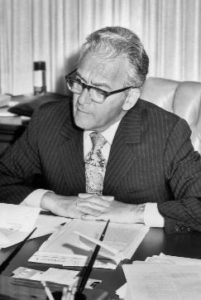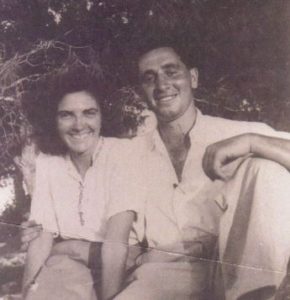 Aharon Yehuda Leib Shteinman (1914-2017) was born in what is now the city of Brest, Belarus. To avoid being conscripted into the Polish army, the young yeshiva student fled to Switzerland with some classmates. He continued his diligent studies in a Swiss yeshiva until being arrested during World War II and sent to a labour camp. Shteinman was the only member of his family to survive the Holocaust. He settled in Israel after the war. There, the young rabbi quickly made a name for himself as a Torah prodigy, and was soon appointed rosh yeshiva, head of a Torah academy. He would serve as a rosh yeshiva for the next five decades, while also establishing a number of children’s schools for the underprivileged. Meanwhile, Rav Shteinman wrote profusely, authoring dozens of bestselling books and discourses on Torah, Talmud, and Jewish thought, as well as being recognized as an expert in the field of education. While abstaining from politics himself, Rav Shteinman was the spiritual leader of Israel’s Degel HaTorah party, playing an influential role in government. In his 90s, and in frail health, the Rav decided to journey around the world to strengthen Jewish communities. Countless thousands gathered to greet him and hear his wise words in Los Angeles, New York, Mexico City, Buenos Aires, Manchester, Odessa, Berlin, Gibraltar, Paris, and many more small towns. On these trips, he would give as many as 10 talks a day.
Aharon Yehuda Leib Shteinman (1914-2017) was born in what is now the city of Brest, Belarus. To avoid being conscripted into the Polish army, the young yeshiva student fled to Switzerland with some classmates. He continued his diligent studies in a Swiss yeshiva until being arrested during World War II and sent to a labour camp. Shteinman was the only member of his family to survive the Holocaust. He settled in Israel after the war. There, the young rabbi quickly made a name for himself as a Torah prodigy, and was soon appointed rosh yeshiva, head of a Torah academy. He would serve as a rosh yeshiva for the next five decades, while also establishing a number of children’s schools for the underprivileged. Meanwhile, Rav Shteinman wrote profusely, authoring dozens of bestselling books and discourses on Torah, Talmud, and Jewish thought, as well as being recognized as an expert in the field of education. While abstaining from politics himself, Rav Shteinman was the spiritual leader of Israel’s Degel HaTorah party, playing an influential role in government. In his 90s, and in frail health, the Rav decided to journey around the world to strengthen Jewish communities. Countless thousands gathered to greet him and hear his wise words in Los Angeles, New York, Mexico City, Buenos Aires, Manchester, Odessa, Berlin, Gibraltar, Paris, and many more small towns. On these trips, he would give as many as 10 talks a day.
 Rav Shteinman was known for his extreme piety, humility, and modesty. His daily diet was nothing but a cucumber, a boiled potato, and one small bowl of oatmeal. He lived in a tiny apartment, with little furniture but walls lined end to end with books. He slept on the same thin mattress that was given to Jewish refugees upon arrival in Israel for some 50 years. Streams of people lined up at his open door each day seeking counsel and blessings. Rav Shteinman stood only for truth, even when it brought him adversity. This was particularly clear when he supported the Nachal Charedi, an IDF unit for yeshiva students. Even after some backlash from ultra-Orthodox communities, the Rav stood his ground and continued his support. He was widely recognized as the gadol hador, the world’s chief rabbi. Sadly, the great rabbi passed away yesterday, at 103 years of age. (His condition had turned critical two weeks ago after the tragic death of his 72-year old daughter from a heart attack, even though no one had told him of her passing.) Rav Shteinman wrote in his will that it would suffice to have just ten men to carry out his funeral, and requested no eulogies. Nonetheless, the funeral procession brought over 600,000 people. Israel’s President Reuven Rivlin stated that Rav Shteinman “bore the entire weight of the Jewish people’s existence on his shoulders… he knew how to convey his ideas gently, in a pleasant manner, and with a great love of the Jewish people… He was a man whose wisdom was exceeded only by his humility.”
Rav Shteinman was known for his extreme piety, humility, and modesty. His daily diet was nothing but a cucumber, a boiled potato, and one small bowl of oatmeal. He lived in a tiny apartment, with little furniture but walls lined end to end with books. He slept on the same thin mattress that was given to Jewish refugees upon arrival in Israel for some 50 years. Streams of people lined up at his open door each day seeking counsel and blessings. Rav Shteinman stood only for truth, even when it brought him adversity. This was particularly clear when he supported the Nachal Charedi, an IDF unit for yeshiva students. Even after some backlash from ultra-Orthodox communities, the Rav stood his ground and continued his support. He was widely recognized as the gadol hador, the world’s chief rabbi. Sadly, the great rabbi passed away yesterday, at 103 years of age. (His condition had turned critical two weeks ago after the tragic death of his 72-year old daughter from a heart attack, even though no one had told him of her passing.) Rav Shteinman wrote in his will that it would suffice to have just ten men to carry out his funeral, and requested no eulogies. Nonetheless, the funeral procession brought over 600,000 people. Israel’s President Reuven Rivlin stated that Rav Shteinman “bore the entire weight of the Jewish people’s existence on his shoulders… he knew how to convey his ideas gently, in a pleasant manner, and with a great love of the Jewish people… He was a man whose wisdom was exceeded only by his humility.”
Words of the Week
You are also living on a miracle.
– Rav Shteinman, to a doctor that told him the frail rabbi is “living on a miracle”.

The streets of Bnei Brak fill with hundreds of thousands of mourners for Rav Shteinman’s funeral procession.

 Sol Price (1916-2009) was born in New York City to Jewish-Russian immigrants from Belarus. He grew up in San Diego, where he earned a philosophy degree at San Diego State University before getting a law degree from the University of Southern California. Price was admitted to the bar in 1938. After over a dozen years as a business lawyer, Price had an idea to open a new kind of department store, offering wholesale prices on quality goods sold in bulk. Price opened his first store, called FedMart, in an old airport hangar in 1954. He charged a small membership fee ($2 per family) and kept prices even lower by avoiding advertising, major credit cards, and expensive real estate, and maintaining a small inventory. The model was a great success, and Price expanded rapidly. He pioneered many innovations in retail, including being the first to sell gasoline at wholesale prices, and being the first to have an in-store pharmacy and opticianry. By 1974, FedMart had 45 stores and over $300 million in sales. The following year, FedMart was bought out by a German retailer, and Price was soon kicked out of the company. He then started a new chain, Price Club, in an old factory once owned by Howard Hughes. Price Club expanded quickly, too, and went public in 1980. A few years later, one of Price Club’s employees teamed up with a wealthy lawyer (whose own Jewish family was successful in retail) to start a competing wholesaler, called Costco. In 1993. Price Club merged with Costco to form PriceCostco, together having 206 locations and $16 billion in sales. By 1997, Costco became the official company name, and today, Costco has over 700 locations around the world, with 85 million members, and 174,000 employees. It is the second largest retailer, and the 18th richest company in the world, with $120 billion in revenue. Costco is second only to Wal-Mart. Ironically, Sam Walton wrote in his book that he “borrowed” most of his ideas from Sol Price, and called his store “Wal-Mart” because he liked Sol Price’s FedMart! Not surprisingly, Price is often called the “father of the wholesale retail industry”. He was also a generous philanthropist, having donated tens of millions to various causes, especially in his hometown of San Diego.
Sol Price (1916-2009) was born in New York City to Jewish-Russian immigrants from Belarus. He grew up in San Diego, where he earned a philosophy degree at San Diego State University before getting a law degree from the University of Southern California. Price was admitted to the bar in 1938. After over a dozen years as a business lawyer, Price had an idea to open a new kind of department store, offering wholesale prices on quality goods sold in bulk. Price opened his first store, called FedMart, in an old airport hangar in 1954. He charged a small membership fee ($2 per family) and kept prices even lower by avoiding advertising, major credit cards, and expensive real estate, and maintaining a small inventory. The model was a great success, and Price expanded rapidly. He pioneered many innovations in retail, including being the first to sell gasoline at wholesale prices, and being the first to have an in-store pharmacy and opticianry. By 1974, FedMart had 45 stores and over $300 million in sales. The following year, FedMart was bought out by a German retailer, and Price was soon kicked out of the company. He then started a new chain, Price Club, in an old factory once owned by Howard Hughes. Price Club expanded quickly, too, and went public in 1980. A few years later, one of Price Club’s employees teamed up with a wealthy lawyer (whose own Jewish family was successful in retail) to start a competing wholesaler, called Costco. In 1993. Price Club merged with Costco to form PriceCostco, together having 206 locations and $16 billion in sales. By 1997, Costco became the official company name, and today, Costco has over 700 locations around the world, with 85 million members, and 174,000 employees. It is the second largest retailer, and the 18th richest company in the world, with $120 billion in revenue. Costco is second only to Wal-Mart. Ironically, Sam Walton wrote in his book that he “borrowed” most of his ideas from Sol Price, and called his store “Wal-Mart” because he liked Sol Price’s FedMart! Not surprisingly, Price is often called the “father of the wholesale retail industry”. He was also a generous philanthropist, having donated tens of millions to various causes, especially in his hometown of San Diego.